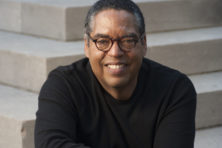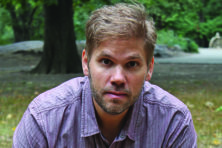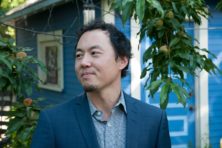Questions & Authors: JoAnn Balingit
- Share
- Tweet
- Pin
- Share

by Jerod Santek, Artistic Director, Write On, Door County
JoAnn Balingit, a former poet laureate of Delaware, will be in
residence at Write On the week of Sept. 15. She is the author of the
full-length collection Words for House Story and several
chapbooks. I recently talked with her about her writing and her
career.
Jerod Santek (JS): You work in both poetry and memoir and said,
“My writing exists on a continuum rather than this being a poem
idea and that being a story idea.” Could you talk a bit more about
that and how you create a hybrid form?
JoAnn Balingit (JB): I write daily in prose, whether I’m writing
longhand or typing, and I enjoy revising sentences to make them
beautiful, and the language more striking. I don’t assign form to
these thoughts and observations right away, especially if the entry
reads as wild or absurd, but later, rereading the entries, I might
recognize the sounds of a poem or realize that a paragraph is
working out a thought problem related to a story or scene I am
working on in my memoir.
It takes time to understand what the unconscious is trying to work
out, so I don’t assign my raw writing a certain “job.” That’s a lot of
pressure, and I am trying to learn to give myself freedom to write
without fearing the result. Good or boring, publishable or not, my
goal is to understand my impulses and to figure out how to express
an idea once I get close to it.
As far as creating a hybrid form, I love prose poems and lyric
essays because I enjoy the surprise and prayer-like intensity of
poetic language. I am working on short essays that employ
repetition, sonics and metaphor as the unifying structures rather
than primarily the story arc or narrative time.
JS: From 2008 to 2015, you served as Delaware’s poet laureate.
Can you talk about the role of poet laureate and the importance of
poetry in our culture today?
JB: The first thing I realized after my appointment is that people
want permission to write their stories, to write poetry, and that they
often write in secret, meaning in isolation. People want to feel
connected, be seen and be given permission to feel and share their
feelings. I made it a mission to create opportunities to support
working writers plus those who aspire to write.
Furthermore, in the classroom, where I concentrated most of my
volunteer hours as poet laureate, I considered my presence as a
living writer important: to allow students to see that writers are real
people who love language and stories, but who also watch TV and
send text messages and eat ice cream. That is, not all writers are
historical figures in books. The message I wanted to get across is
that they could be writers, too. Poetry teaches the culture empathy,
to trust in and respect the power of language, and how to attach
vocabulary to feelings.
JS: You have been involved in many writing communities. What
is so important about programs such as Write On?
JB: Writing communities are so important to all of us. Toni
Morrison said stories have the power to fight “ignorance in so
many places, that must be undone.” Creative-writing programs in
schools give students belief in their words. That belief is necessary
and important for the country’s future. Meeting members of your
tribe who inspire and encourage you is the difference between
giving up and writing with joy and a sense of belonging and
mission, even when the going gets rough.
JS: What is the best advice you received?
JB: Never give up. I recently went to Hedgebrook, and the most
kick-ass writer I met there is 72 and working on her first book, a
phenomenal memoir. Persistence is all.
Balingit will offer “Everybody Answered the Phone,” a public
program on revision on Sept. 17. Visit writeondoorcounty.org for
details and the full interview.





